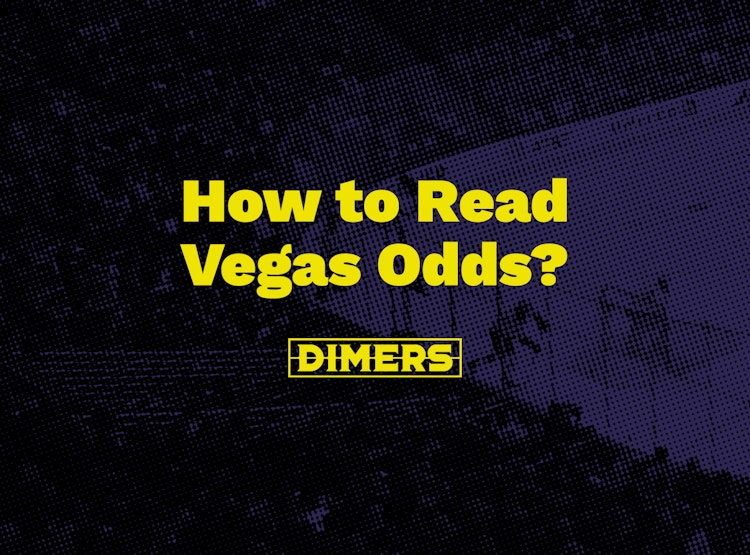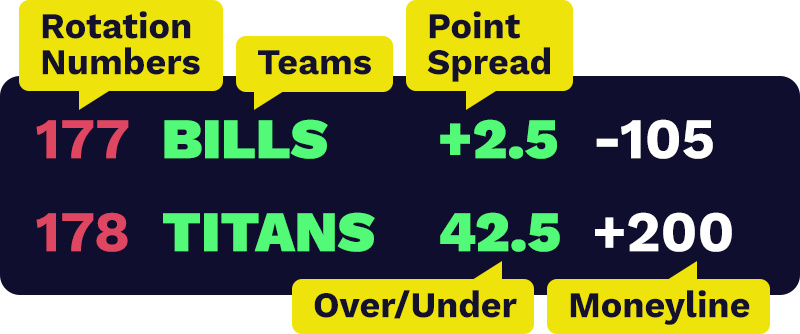How to Read Vegas Odds

Ah Las Vegas, the home of sports betting for decades…and a few other things of course, but you know how it is. What happens in Vegas, stays in Vegas…unless of course, it’s a nice payout thanks to Dimers' best bet choices.
We’ve all seen the gigantic boards with your favorite NFL, NBA and NHL teams all over it. It can be overwhelming and hard to know where to look. That’s why Dimers.com is breaking down how to read Vegas odds!
What are Vegas Odds?
In short, Las Vegas odds are normal American odds. They're no different to what you see on a sportsbook site or app every time you log in and deposit.
In terms of betting within the United States, odds originated from Las Vegas, which is essentially why they’re called Vegas Odds — it’s a homage of sorts.
Vegas sports betting odds include but are not limited to the moneyline, spread betting, Over/Under, prop bets and other sports betting options, and you see them frequently on sites like this.
MORE: Vegas Odds Calculator and Decimal Converter
How to read Vegas Odds

Still a bit confused with what it all means? Don’t worry here’s the breakdown of a Vegas odds board.
Rotation Numbers
- They may look unnecessary but with so many sports teams on a Vegas odds board, rotation numbers are essential.
- By aligning a team with a number the betting process at a brick-and-mortar sportsbook is simplified, taking the confusion away for you.
- Saying "Give me Los Angeles +100", would be stupid given there are 9 pro sports teams within LA. That’s why we’ve got the numbers! So don’t be that dude.
Teams
- Pretty self-explanatory this one. You’ll generally see NFL, NBA, NHL, MLB and even Premier League teams filling up an odds board in casinos.
- Often, the league is listed at the top of the board.
Point Spread
- The spread is essentially a sportsbook’s way of leveling out two unequal opponents.
- The underdog team is given a ‘head start’ in the form of points.
- To cover the spread, a favored team needs to win the game by the specified amount of points.
- An underdog can either win, or lose by the number to cover.
- The line can move prior to games and even during the match. It will fluctuate depending on injuries, momentum and naturally, the scoreboard.
Example:
New England Patriots -3.5
Denver Broncos +3.5
If you bet Denver at +3.5, they would need to lose by under 3.5 points — or win outright — to cover the spread.
Conversely, if you bet New England (-3.5) against the spread, the Patriots would need to win by 4+ points to ensure a profit.
Over/Under
Betting the total in any sports game simply means you are wagering on how many points will be scored overall, NOT who will win.
Example:
New York Knicks vs. Detroit Pistons — Over/Under 143.5
- Bet the Over (144+ points to be scored by both teams)
- Bet the Under (143 points or less to be scored in total)
- There are other options to choose from, including scoring totals for a particular quarter/half, home team points and more
Moneyline (H2H)
The moneyline is the simplest bet to make in sports! Betting the moneyline simply means you are picking a team to win the game outright.
If a team is favored they will have a "-" next to their name. Conversely, the underdog will have a “+.”
Example:
If a team has a -200 moneyline it means you need to wager $200 in order to win $100.
If a team has a “+” moneyline, the goalposts shift. The + tells us how much you would win betting $100, if you win of course.
For example, a +150 moneyline would mean — if successful — a profit of $150 ($250 total).
MORE: Where Do Sports Odds Come From?
What are Vegas Lines?
Surprise, surprise. Vegas lines are no different from any other moneyline, spread, Over/Under (total) betting selection available.
Most of the lines seen in sportsbooks today still come from Las Vegas oddsmakers, who have had systems in place to determine the betting lines for almost a century.
Like Dimers’ predictive analytics model, which simulates every major sports match 10,000 times to find the best bets for you, Vegas uses factors such as injuries, form, previous matchups and weather forecasts to determine the line.
Often you will hear sportscasters saying Vegas has X team +5, this doesn’t mean Colorado or New Jersey has them at +8. No, they say Vegas because they essentially preside over the betting lines set for sportsbooks in America.
MORE: Where Does the Spread Come From?
What is the Vig or Juice in betting?
Think of it like sportsbook tax. Like any business, sportsbooks want to make a profit no matter what. Often, you’ll see spread or over/under bets with +110 or -110 odds.
The extra $10 does two things; it ensures sportsbooks make a profit and keeps odds even, which is crucial to attracting betting interest to both teams/sides. Another way of viewing the vig/juice is, it’s the price you’re paying for an opportunity to bet on sports.
MORE: Fastest Withdrawal Options For Online Sportsbooks
What is the overround in betting?
The overround is very similar to the juice. However, it refers to a situation in which the implied probability for an event exceeds 100%, say 104%.
Example:
CFB National Championship – Moneyline
Alabama Crimson Tide -250 (implied probability of 71.43%)
Clemson Tigers +200 (implied probability = 33.33%)
Implied probability = 104.76%
Of course, the probability of an event being 104% likely is impossible. The extra 3% is the profit margin sportsbooks take to make a little extra.
Now that you know how to read Vegas' sports odds, why don’t you keep the momentum rolling and check out the best sportsbooks in your state. Before you deposit money into your sportsbook account, use Dimers’ exclusive promo codes for a free bet and other great rewards.
Don't have a sports betting account? Join a legal online sportsbook and start betting today!
